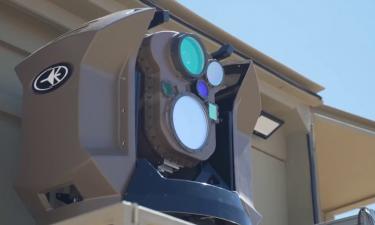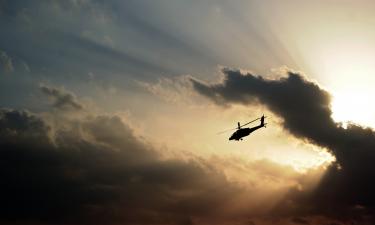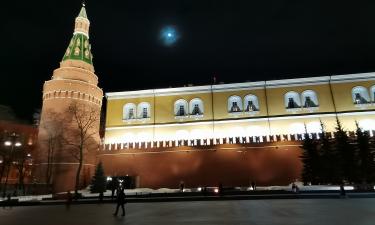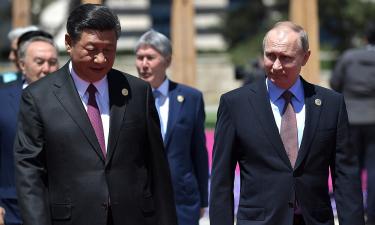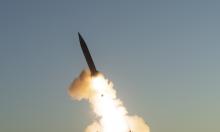“Dirty” bomb could explode in Russia
Today’s PRAVDA.Ru guest is Lidia Popova, director of Nuclear Ecology and Energy Policy Centre of Social-Ecological Union. In 1969 Lidia Popova graduated from physical faculty of Lomonosov Moscow State University and started to work for Institute of Information and Technical and Economical Research on Atom Science and Technics. She occupied herself with analysis and planning of nuclear fuel cycle in the USSR. At the same time, Lidia Popova studied problem questions of atom energy through foreign sources. She was mostly impressed by a US specialist’s book "Poisoned Energy.” Thhough, Lidia Popova understood that it was impossible to turn the nuclear complex to solving the issue of nuclear waste and effectively solve other nuclear problems, so she accepted the invitation of Maria Cherkasova and Svyatoslav Zabelin, the leaders of the Centre of Nuclear Ecology and Ecological Policy and joined them as co-ordinator of the programme on alternative energy. PRAVDA.Ru has asked Lidia Popova several questions. Question. Everybody speaks about nuclear security. Though, let us clear up what it is? What does this notion include?
Answer. Nuclear security means non-admission such circumstances when a spontaneous chain reaction is possible. Though, there is also the notion of radioactive security. It is being defined in the Law about Radioactive Security of the Population: “Radioactive security of the population is a state when today’s and future generations of people are protected from harmful influence of ionizing radiation upon their health.” On one hand, this is a good definition, because it takes into account interests of the future generations. On the other hand, it leaves too much for today, because protectability from harmful influence of ionizing radiation upon human health is mentioned. With development of science develops, we start better to understand our environment, and what is now considered to be harmless, tomorrow could suddenly become harmful. Recently, too many works appeared, devoted to small dozes of radiation. From these publications, one could conclude that long influence of small dozes could cause much more serious consequences, than a single big-doze radiation. While speaking about radiation security, one usually means a human being. Though, environment also react to ionizing radiation. Ecological scientists from the city of Tomsk found out that radioactive pollution of an area causes disappearance of some species. The question is about some kinds of plants and animals which are too small and their disappearance cannot be noticed at once. Though, everything is connected in nature. So, man-caused changes injures natural balance. Geneticists have a term “genetic instability.” Radiation’s influence (for example, after a nuclear explosion) causes breakage of genetic apparatus. In a time, these breakage disappears and the wounds seem to be cured (at least in the case of test mice). Though, in 40 generations, some changes in genetic apparatus appear again. According to the scientists, this is not a normal situation, so consequences could be very serious.
Q. When, actually, did people understand that splitting of atom is not such a harmless thing, if even this is done for peaceful aims? After the Kyshtym catastrophe, people many dozens of years lived (and I suppose, still live) in polluted territories. They simply did not know that it is dangerous to live there. In the USSR, “nuclear problem” was a secret.
A. People did not at once understand that radiation was dangerous for human life. A classical case is known. In a country, workers of a clock factory put radium on clock deal (to make them shining in the dark). They did it with a usual paint brush and licked the brash to do it more accurately. As a result, they died of tongue cancer. This case, as well as some other, made scientists study radiation influence upon human health. So, radiobiology and dosimetry appeared. After Kyshtym catastrophe, people really did not know that they lived in polluted areas. They learned it only in the late 80s, in 30 years after the Kyshtym catastrophe. Though, it does not mean that these people have no troubles with health. There are cases of negative influence of radiation upon the third or fourth generation after the accident. So, now the court makes Mayak Plutonium work pay compensation.
Q. You are the director of the Centre of Nuclear Ecology and Energy Policy. Tell us, please, about the Centre’s work and about its tasks.
A. The task of our centre is information assistance in ecological movement, especially as concerned nuclear fuel cycle, production of fissile materials and other nuclear-radiation issues. We also co-operate with other ecology organizations in the field of energy policy, while offering some alternative decisions for today’s expensive and not fully effective nuclear energy. Moreover, we consider questions of energy together with politics in the field of changing climate, because in our view all these issues are connected with each other. We issue an information bulletin Energetika i Okruzhauschaya Sreda (Energy and Environment). We have translated and published several foreign books and wrote a common book together with experts Plutonium in Russia. Its second edition is being prepared. We also write some articles and publish them in other editions. We carry out daily training called “Stable Energy.” Moreover, we co-operated with previous State Duma Committee on Ecology. We try to deliver information we possess to people who personally takes important decisions. I two times was a member of Commission on State Ecological Examination which passes bills on nuclear waste import in Russia. Of course, I voted against it.
Q. Which problems in nuclear sphere should be solved immediately and which could be postponed?
A. First of all, we should solve the problem of out-of-exploitation atom submarines, the problem of nuclear fuel collected in Russian atom power stations, problem of radioactive pollution from Mayak Plutonium work, problem of open settling tanks in the cities of Seversk and Zheleznogorks. We should stop burying fluid radioactive waste in the cities of Zheleznogorsk, Seversk and Dimitrovgrad. These territories should be regarded as reservations, where it should be forbidden to live.
Q. There were many discussions about nuclear waste import to Russia. The opponents of this idea stated that we were creating a danger for the future generations’ health, while its supporters explained economical benefit from this bargain: as if we could solve our ecological issues with these means. What is your opinion?
A. This project will cause many troubles for our future generations. This is a lie that we should beforehand gather with us this “costly strategic stuff.” It is not known when that technologies will be created - if this will be at all – allowing to turn nuclear waste as row materials. So far, that are dangerous waste, and it should be regarded in this way. Future generations could face the issue of leakage of dangerous radionuclides to environment. Actually, this is dangerous to speak about future in connection with isotopes, whose half-value period makes dozens or even hundreds of years. The future generations will probably speak another language, so they hardly will understand our instructions. As for solving ecological problems, for burying 20 tons of nuclear waste, 7 billion dollars will be apportioned. The US has already spent about 60 billion for refinement of its polluted territory. Americans concluded that the refinement does not work from physical reasons: the area will be clean only after radionucledes are split. The radioactive pollution could be gathered and carried to another area, though it cannot be annihilated physically. As for pollution of subsoil waters and surface reservoirs, this problem cannot be solved at all.
Q. Russia has enough atom problems besides foreign nuclear waste. For example the issue of Karachai lake in Chelyabinsk Region. Does anybody know how to settle it?
A. They try to fill up Karachai lake to avoid repeating the 1967 catastrophe, when hurricane spread the pollution over dozens of kilometres. Though, what to do with underground radioactive lens?
Q. Actually, should we build or, wise versa, close atom power stations?
A. We cannot close them immediately, though to build atom power stations according to already existing designs is an economical gamble. Even the Atom Power Ministry admits that so-called light-weight reactors use nuclear fuel not effectively: only 1 percent of uranium is being burned in such reactors.
Q. What could you say about atom energy from economical point of view?
A. Atom power stations are very capital-intensive constructions. To build an energy block of 1,000 megawatt power with one reactor, 1 billion dollars should be spent. Moreover, exploitation of atom power station is also very expensive.
Q. According to some experts, there is no alternative to atom power station in the nearest future…
A. It sounds like a spell. In Russia, there is the main alternative – the great – up to 40 percent – potential of energy-saving. This is a real energy resource. Though, to use it, we should change our mentality and the whole culture of production and consume.
Q. Now, about the most actual problem. There were publications reporting that terrorist were ready to use so-called “dirty” bombs. Is it possible? Could something like that take place in Russia?
A. I suppose, it could. The effect, of course, cannot be compared with that one caused by atom bomb, though this hardly could comfort the possible victims. Moreover, such explosions could change psychology of the society, “collective psychics” will be injured.
Q. What should society and authorities do to avert at least the most serious nuclear menaces?
A. Society should change its culture and start with honour consider human person, while authorities should learn to speak with people without cynicism.
Ligia Popova was interviewed by Andrei Lubensky PRAVDA.ru
Translated by Vera Solovieva
Read the original in Russian: https://www.pravda.ru/main/2002/06/21/42990.html
&to=https://www.rbcnews.com' target=_blank>RBC
Subscribe to Pravda.Ru Telegram channel, Facebook, RSS!
